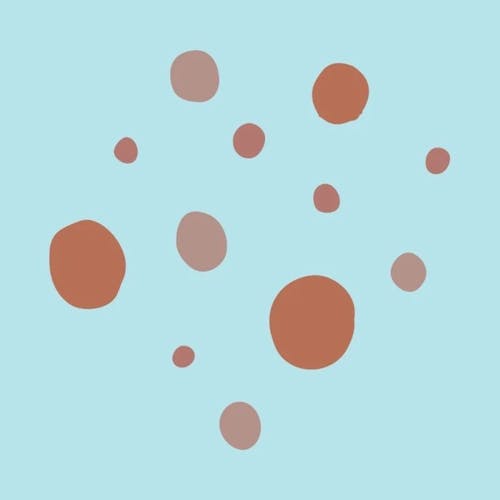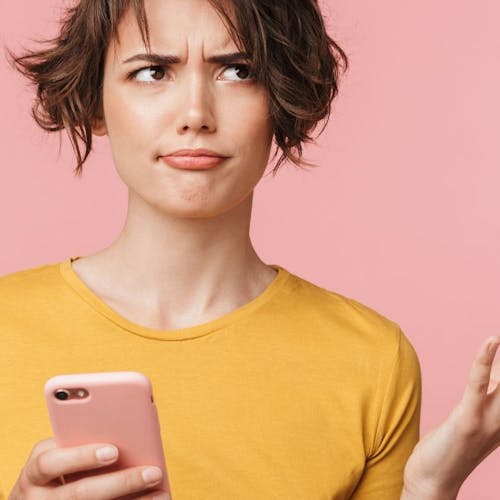This website uses cookies to enhance the user experience. By using Yoppie you are agreeing to our use of cookies.
Periods Stopping & Starting: What's Happening?
Written by Yoppie
14 Feb 2022
What does it mean to have irregular periods?
Is it normal for periods to stop and start?
What if the stop-starting happens throughout the month?
Should I be worried?
Can irregular periods themselves cause any issues?
Should I see a doctor?
Jeez, make up your mind already! If your period keeps starting… then stopping… then starting again, and you can’t seem to find a pattern, you may have irregular periods, also known as oligomenorrhea. If you’re wondering what the heck is going on, here’s a deep dive on all things irregular periods. Let’s see what could be happening to your body.
What does it mean to have irregular periods?
Having irregular periods means the length of your menstrual cycle and your bleed keeps changing, with periods arriving early or late every time and not lasting the length you expect. The average is 28 days, but not everyone will experience a cycle that’s exactly 28 - most will be shorter or longer. When puberty is over, most people end up with a cycle with a similar length of time between periods, but it’s normal for this to fluctuate by a few days each time.
Irregular periods are normal during puberty, and if this has always been the norm for you then it’s likely fine. If not, the most common reasons for experiencing irregular periods after puberty include the use of hormonal contraception, extreme weight loss, stress, pregnancy, the beginning of menopause, or an underlying medical condition (we’ll cover these later).
Is it normal for periods to stop and start?
For some, yes. Periods that are start/stop are pretty common, with around 14-25% of people with periods experiencing irregular menstrual cycles, according to the National Institutes of Health. It is thought that the average person loses around 2-3 tablespoons of blood in one period, consisting of some blood and some tissue from the lining of the uterus.
Sometimes this lining doesn’t shed at regular intervals, so you may have lighter and heavier days. And sometimes tissue can block the flow of blood through the cervix, resulting in a lighter flow, and potentially a start-stop pattern. If your period still lasts 3-7 days, a little fluctuation in blood flow is considered normal and probably nothing to worry about.
What if the stop-starting happens throughout the month?
Having a period that stops and starts frequently is often the result of hormone fluctuations. While bleeding, your estrogen and progesterone levels are low, and in the first 4 or 5 days of your cycle the pituitary gland produces more follicle-stimulating hormone (FSH) while your ovaries produce more estrogen. Then around days 5 to 7 estrogen levels reach their peak, the pituitary gland releases luteinizing hormone (LH), and progesterone levels go up.
So there’s quite a lot happening hormone-wise! And all that activity can result in - for some people - periods that start, then stop, then start again. Hormones are typically the culprit, but outside factors that also affect this include being overly stressed, losing a lot of weight very quickly, over-exercising, pregnancy, breastfeeding, and some underlying health conditions.
Should I be worried?
Usually irregular periods are nothing to worry about, but if you used to have a regular flow and it’s changed recently, it’s probably best to get it checked out. In some cases, a change in period flow or regularity could be an indication of an underlying health condition, such as:
- Fibroids - abnormal benign growths that grow in or on the uterus
- Endometriosis - when tissue grows outside the uterus, where it’s not supposed to be
- Polycystic ovary syndrome (PCOS) - when the ovaries produce excess androgen hormones and sometimes small cysts form in the ovaries
Can irregular periods themselves cause any issues?
Usually, no… but sometimes yes. Irregular periods that last a long time could cause you to be more susceptible to other issues:
- Iron deficiency, or anaemia: If you lose a lot of blood due to more frequent periods, you could develop an iron deficiency
- Fertility issues: Irregular periods could mean you’re not ovulating, and therefore could struggle to get pregnant if you are trying to have a baby
- Osteoporosis: The ovulation part of your cycle produces more of the estrogen hormone, which - fun fact - helps keep bones strong! If you don’t ovulate, you may have less estrogen and have a higher risk of osteoporosis
- Cardiovascular disease: As above, a lack of estrogen can also increase your risk of cardiovascular disease
- Endometrial hyperplasia: Without regular periods to shed the uterine lining, you could be at higher risk of developing this condition in which the uterus lining becomes abnormally thick. This can increase the risk of endometrial cancer, so it’s important to have it checked out
Should I see a doctor?
Irregular periods may not seem like something to go to a doctor about, but if you have just started experiencing a random pattern of periods and you don’t know why, it’s probably a good idea to get it checked out to make sure everything is A-OK. Similarly, if you are in any pain, you should always see your doctor to rule out anything serious.
Basically, see your doctor if:
- You get abnormally heavy bleeding (as in, need more than one tampon or pad every hour for a few hours)
- Your periods last longer than 7 days (yikes!), or they’re less than 21 days apart, or more than 35 days apart
- Your periods have disappeared for longer than 3 months (and you’re not pregnant)
- You have bleeding or spotting between periods, or experiencing unusual discharge
- You experience any severe or new pain during your period, or nausea and vomiting
- You have any of the symptoms of TSS (toxic shock syndrome) like fever, diarrhoea or dizziness
Still wondering why your period might be irregular? You can chat with others over on our Full Stop FB group, or reach out to us directly on Instagram at @itsyoppie - we’re always happy to help you find the answers you need! Don't forget that our personalised menstrual care subscription can get organic tampons, PMS supplements and much more delivered easily and regularly through your letterbox, whatever your flow.
Section jump
Back to top
Subscribe To Our Newsletter
YOPPIE





© 2025 Yoppie is a registered trademark of Phlo Technologies Ltd.
Yoppie's supplements are not a substitute for a varied diet and healthy lifestyle and are not intended to diagnose, treat, or cure any disease. If you are pregnant, breastfeeding, have a medical condition or are under medical supervision, please consult with your doctor before taking any of our products.






